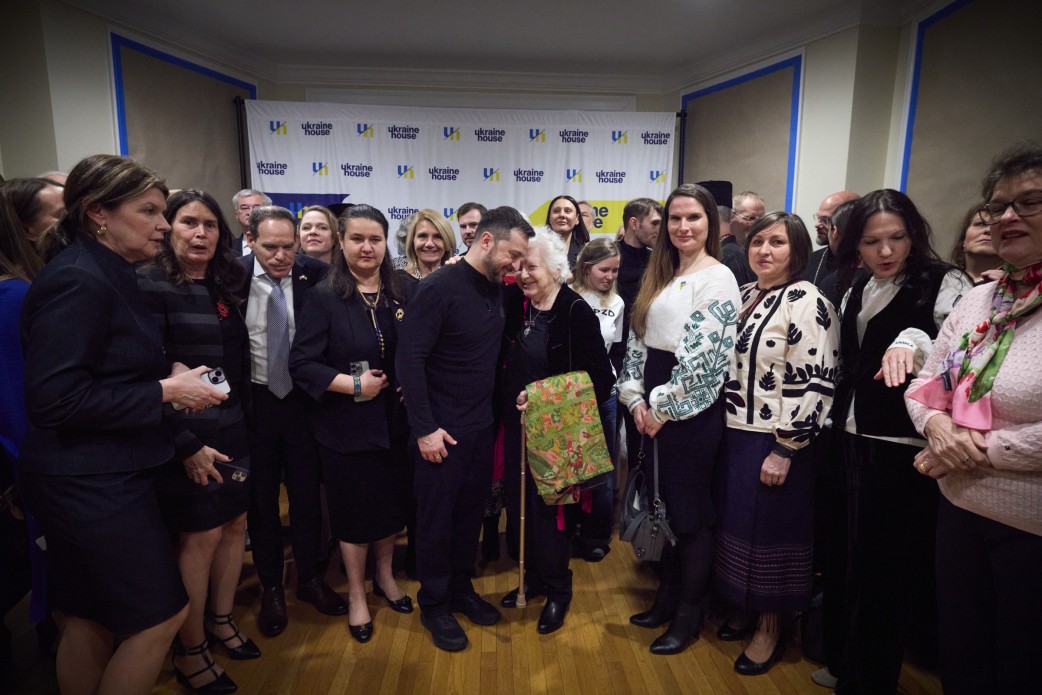
At Ukraine house in Washington, President of Ukraine Volodymyr Zelenskyy today met with the Ukrainian community and war veteran Andrii Smolenskyi, who is undergoing treatment in the United States.
Moscow/Washington: Russia today labeled the confrontation of Ukrainian President Volodymyr Zelenskyy with President Donald Trump and Vice President JD Vance that compelled Zelenskyy to cut his White House visit short, as an “epic political and diplomatic failure” for Ukraine.
What was supposed to be a discussion between Zelenskyy and Trump to finalize a minerals agreement—granting the US access to Ukraine’s rare-earth resources in exchange for ongoing assistance—ended abruptly without any consensus.
Russian Foreign Ministry Spokeswoman Maria Zakharova criticized Zelenskyy for what she described as his “outrageously rude behaviour” during his time in Washington, asserting that he has re-affirmed his status as the “most dangerous threat to the international community as an irresponsible figure that can stir up a big war”. She further remarked that the unprecedented reprimand he received from the U.S. President reflects not only the political frailty of European leaders who back him but also highlights the moral decline associated with supporting a leader she characterized as disconnected from reality.
“The demilitarisation and denazification of Ukraine, as well as recognition of existing realities on the ground, remain Russia’s unchanged objectives. The sooner Kyiv and the European capitals in question come to realise this, the closer to a peaceful settlement of the Ukraine crisis we will be,” Zakharova said. She asserted that Zelenskyy heads a neo-Nazi regime, reiterating that the Russian side has consistently labeled him a “corrupt individual” disconnected from reality and unable to honor agreements. Zakharova described him as a cynical figure willing to go to any lengths to maintain his power, which he has secured through dismantling opposition and establishing a totalitarian regime. She emphasized that he is recklessly sending millions of his own citizens to their deaths while showing no accountability in the face of escalating political turmoil, remaining fixated on prolonging the conflict and rejecting peace, which ultimately leads to his own demise.
Tensions escalated when Vice President Vance openly rebuked Zelenskyy for his perceived lack of appreciation for American assistance, dismissing his diplomatic mission as merely a “propaganda tour.” In response, Zelenskyy pointed out Russia’s history of violating agreements, expressing doubt about trusting President Vladimir Putin without solid security guarantees. President Trump intensified the situation by accusing Zelenskyy of “gambling with World War III,” effectively bringing the discussions to a halt.
Moscow emphasized that a fair and enduring peace cannot be realized unless the fundamental issues at the heart of the Ukraine crisis are thoroughly addressed, with Zakharova identifying key concerns such as the West’s failure to uphold its promises regarding NATO expansion and the Kyiv regime’s systematic efforts to erase Russian language, culture, and religion, drawing parallels to the actions of the Nazis in history.
The public confrontation during Zelenskyy’s fiery meeting with President Donald Trump and Vice President J.D. Vance has also ignited strong reactions across the globe.
Leaders from Canada, Norway, Lithuania, Poland, Spain, and Moldova have condemned Trump’s remarks and reaffirmed their support for Ukraine. Canadian Prime Minister Justin Trudeau and Moldovan President Maia Sandu, among others, have underscored their unwavering commitment to Ukraine’s sovereignty and its struggle against Russian aggression.
This incident has created a significant divide among lawmakers in the United States too. Some Republicans are backing Trump’s viewpoint, arguing that Zelenskyy’s stance undermines diplomatic efforts. In contrast, Democratic leaders have criticized Trump’s behavior, asserting that it jeopardizes the U.S.-Ukraine alliance and emboldens Russian aggression.
At Ukraine House in Washington, President Zelenskyy underscored the importance of keeping Ukraine’s narrative alive, stating, “It is vital for us that Ukraine’s voice remains prominent and that it is not forgotten—both during the ongoing conflict and in the aftermath… The people of Ukraine need to feel assured that they are not isolated, that their concerns are acknowledged in every nation and every part of the globe.”
Zelenskyy’s trip to the White House on February 28, 2025, aimed to strengthen the ties between the U.S. and Ukraine while seeking support against Russian hostilities. However, the meeting quickly escalated into a contentious confrontation with President Donald Trump and Vice President J.D. Vance. This unforeseen outcome and the inability to secure the minerals deal have sparked concerns regarding the trajectory of U.S.-Ukraine relations and the broader geopolitical landscape.
The episode highlights the fragility of diplomatic initiatives and the intricate challenges that come with addressing persistent international disputes.





